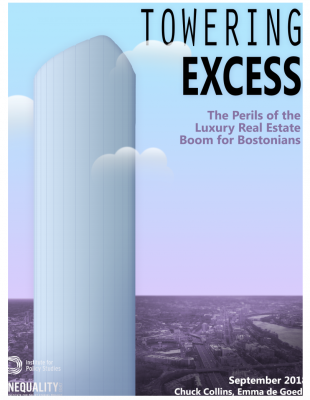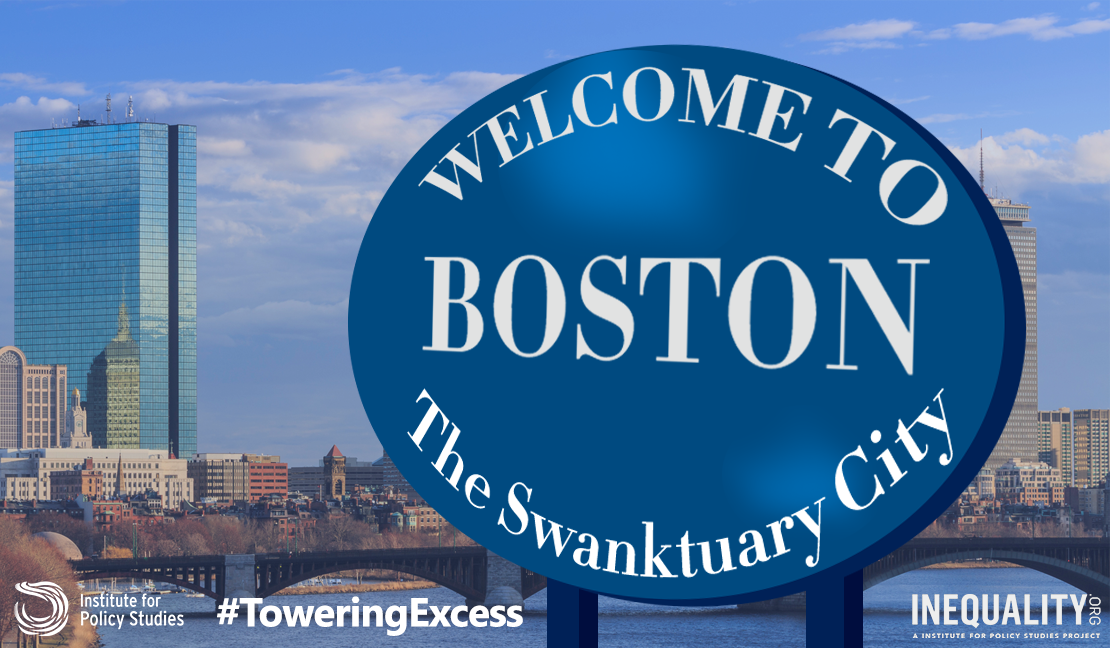 Boston is experiencing a luxury real estate boom, with thousands of new luxury residential and rental units in different stages of development. This report questions the benefits of Boston’s luxury housing boom while providing a closer look at who is buying Boston and the potential risks to the city.
Boston is experiencing a luxury real estate boom, with thousands of new luxury residential and rental units in different stages of development. This report questions the benefits of Boston’s luxury housing boom while providing a closer look at who is buying Boston and the potential risks to the city.
The report, Towering Excess: The Perils of The Luxury Real Estate Boom for Bostonians, examines 12 existing luxury condominium buildings, with 1,805 units, with average values over $3 million, finding that many of these condominiums are not for existing Bostonians.
These pages examine how Boston could better protect the public interest and, in the process, capture more of the current luxury real estate wealth flow to support affordable housing for Boston residents. We focus here on residential condominium ownership as a form of “wealth storage” and examine twelve of the highest-priced and presently occupied luxury housing developments constructed in Boston over the last decade.
Key Takeaways:
- These twelve projects, totaling 1,805 units, have an average condominium price of $3.02 million, a price 50 times higher than Boston’s median household income.
- Over 35 percent of these units are owned by limited liability companies (LLCs) or trusts that obscure the real owners and beneficiaries. Almost 40 percent of the LLCs owning Boston luxury properties have organized themselves in the state of Delaware, the premiere secrecy jurisdiction in the United States. This Delaware connection shields the owners from public detection.
- Of these 1,805 luxury units, 64 percent do not claim a residential exemption, a clear indication that the condo owners are not using their units as their primary residence.
- Some of Boston’s new luxury buildings stand out as textbook “wealth storage” properties. The 51 condominium units above the Mandarin Oriental Hotel at the Prudential Center, for instance, sold for an average of $6.5 million. Over 56 percent of these units are owned by trusts, LLCs, and shell corporations, and fewer than 18 percent claim a residential exemption. The Millennium Tower has 443 units averaging $2.4 million in assessed value. Over 35 percent are owned by shell corporations and trusts, and almost 80 percent of the units do not claim the residential exemption. Half of the LLCs that own units at Millennium Towers are organized in Delaware.
- This report’s authors have identified a number of “red flag” transactions that in other jurisdictions would likely trigger a Treasury Department FinCEN criminal investigation. These include a large number of properties purchased through cash transactions by shell corporations and international buyers. Cash transactions greatly increase the risk that the properties involved are being used to launder money from criminal activities and speed capital flight.
This report also offers several recommendations the City can implement, including:
- Levy a High-End Real Estate Transfer Tax.
- Institute Vacancy Tax and Ordinance.
- Stipulate Municipal Disclosure of Beneficial Ownership in Real Estate.
- Require New Buildings to be Carbon Emissions Neutral.
- Support State and National Transparency Policies.
- Enact Anti-Criminal Oversight.
You can find a summary of some of the report’s key findings here.
